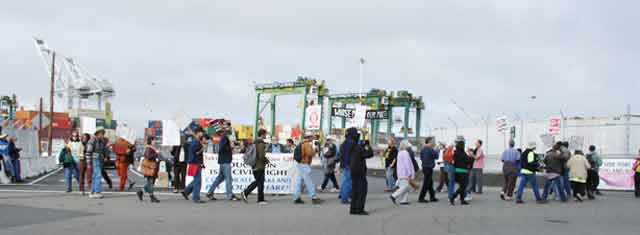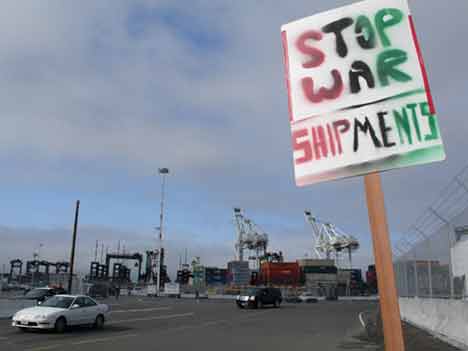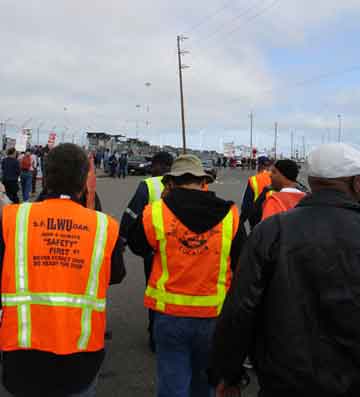
May 2007
Shut Down War Cargo Shipper in Oakland

Antiwar pickets shut down terminal of war cargo shipper in port of Oakland, California May 19.
(Photos: Barucha Calamity Peller)
Yesterday,
May 19, in
Oakland, California dock workers of the International Longshore and
Warehouse
Union (ILWU) Local 10 refused to cross picket lines outside a notorious
war
cargo shipping firm, Stevedoring Services of America (SSA), leaving
three ships
idle for consecutive shifts. The picket was also called against
American
President Lines (APL), which along with SSA handles war materiel from
the
Concord Naval Weapons Station.
When scores of picketers
blocked the gates at the SSA terminal beginning at 7 a.m., the company
eventually gave up and called off the shift. In the evening, an
arbitrator
ruled that this was not a bona fide “health and safety issue” and
ordered the
workers to go to work. However, the
dock workers collectively refused. A black longshoreman insisted that
there was
indeed a safety issue because of the heavy police presence, and
everyone there
remembered how on 7 April 2003, shortly after the U.S. invasion of Iraq
began,
police shot pointblank at protesters and longshoremen at the same
docks,
injuring six ILWU members.
 Yesterday’s picket line was
called by a “popular front” coalition of antiwar groups, the Port
Action
Committee, rather than a labor group. PAC includes the Oakland Green
Party and
the pro-Democratic Party United for Peace and Justice (UFPJ). In
addition,
Oakland’s Democratic mayor Ron Dellums sent a sympathetic letter to the
PAC. But the Oakland Education Association, which is
part of the Action Committee, declared it was holding an official union
picket
(not a bogus “informational picket line”). Union picket signs declared
“OEA
Says Honor the Picket Lines.” And ILWU longshoremen did.
Yesterday’s picket line was
called by a “popular front” coalition of antiwar groups, the Port
Action
Committee, rather than a labor group. PAC includes the Oakland Green
Party and
the pro-Democratic Party United for Peace and Justice (UFPJ). In
addition,
Oakland’s Democratic mayor Ron Dellums sent a sympathetic letter to the
PAC. But the Oakland Education Association, which is
part of the Action Committee, declared it was holding an official union
picket
(not a bogus “informational picket line”). Union picket signs declared
“OEA
Says Honor the Picket Lines.” And ILWU longshoremen did.
The ILWU has officially
opposed the war and occupation of Iraq from the outset, as have most
Bay Area
labor bodies. But paper resolutions have not translated into union action.
In May 2006, Local 10 passed a resolution, “Strike Against the War, No
Peace,
No Work,” calling on unions and working people nationally to “mobilize
for a
strike action” of 24 hours “to demand an immediate end to the war and
occupation in Iraq and Afghanistan and the withdrawal of U.S. troops
from the
Middle East.” But the resolution was buried in committee at the union’s
annual
longshore caucus.
The dock
workers’ action
shows the depth of anger against the war in the U.S. working class and
the real
possibility of labor action against the war. Longshoremen
emphasized the
union’s opposition to the war. Local 10 executive board member Jack
Heyman was
quoted on Oakland’s KTVU (Channel 2) news saying, “I think the message
is loud
and clear… If longshoremen at the Port of Oakland can honor picket
lines
against the war in Iraq, then they can do that in other ports. And this
will be
the beginning of the end of the war.” At the onset of the U.S.-led
imperialist
invasion of Iraq, British railway engineers refused to move weapons
trains, and
Italian rail unions joined with antiwar protesters in seeking to stop
shipments
of military equipment to Iraq. Labor action in the U.S. would
send shock
waves around the world.
 ILWU dock workers
respect antiwar picket line, refusing to go to work on May 19.
ILWU dock workers
respect antiwar picket line, refusing to go to work on May 19.
Since
before the war began,
the Internationalist Group has uniquely called for workers strikes
against
the war and for transportation unions to “hot cargo” (refuse
to
handle) war cargo. A host of opportunist socialist groups
dismissed this
call as hopelessly utopian “pie in the sky.” The Spartacist League,
which
regularly called for such workers action during prior wars, suddenly
dropped
these slogans on the eve of the U.S. invasion of Iraq. At the time of
Democrat
Clinton’s bombing of Iraq in 1998, the SL dismissed the IG’s call for
hot
cargoing, claiming the demand had no “resonance” with workers today.
Yet on May
19, West Coast union dock workers were respecting antiwar picket lines
and
shutting down war shippers.
This can be an important
first step toward the mobilization of workers power to shut down the
war
machine, but that requires a sharp struggle against the bourgeois politics
of the antiwar groups and union officialdom. The OEA calls for money
for
schools not for war, as if it were a matter of budget priorities, and
the PAC
poster made a social-patriotic pitch to “Bring the Troops Home Now,
and
give them the care they need.” Such “peace is patriotic” rhetoric is a
staple
of the UPFJ, but all the antiwar coalitions make similar appeals to
garner
support from Democratic Party liberals. Revolutionaries and
class-conscious
workers, in contrast, emphasize that this imperialist war must
be
opposed by class war.
The
Internationalist Group,
section of the League for the Fourth International, struggles to defeat
the
imperialist war abroad and the war on working people and minorities “at
home.”
Strike action by the unions against the war will mean a direct
confrontation
with the government and its strikebreaking Taft-Hartley Act. This slave
labor
law was pushed through Congress by the Democrats at the height of the
Cold War.
In 2002, it was used against the ILWU on the basis that any strike
would harm
the “war effort.” The ILWU tops buckled before the government’s
threats. Yet in
the 1978-79 coal strike, militant miners ripped up Taft-Hartley
injunctions.
Thus the call for workers strikes and labor boycotts must be part of a
fight to
oust the pro-capitalist union bureaucrats, break with the Democrats and
build a
revolutionary workers party.
n
To contact the Internationalist Group and the League for the Fourth International, send e-mail to: internationalistgroup@msn.com